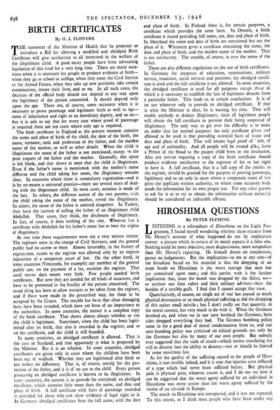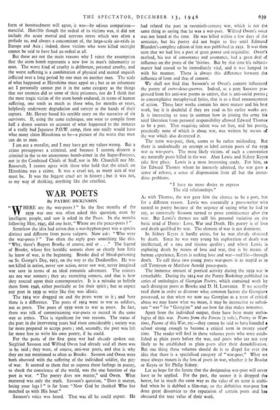HIROSHIMA QUESTIONS
By PETER FLEMING
LISTENING to a rebroadcast of Hiroshima on the Light Pro- gramme, I found myself wondering whether these extracts from Mr. Hersey's account of what happened do not by implication convey a picture which in certain of its moral aspects is a false one. Nothing could be more objective, more dispassionate, more scrupulous than Mr. Hersey's reporting. He himself draws no conclusions, passes no judgements. But the implication—to me at any rate—of the broadcast based on his material is that the dropping of an atom bomb on Hiroshima is the worst outrage that man has yet committed upon man ; and this carries with it the further implication that, since the bomb was dropped by the Allies, we— or anyhow our then rulers and their military advisers—bear the burden of a terrible guilt. I find that I cannot accept this view.
Quantitatively, of course, no single act of war has caused so much physical destruction or so much physical suffering as did the dropping of this rather small missile ; but I don't really see that quantity, in the moral context, has very much to do with it. When the Germans bombed us, and when we in our turn bombed the Germans, both sides dropped everything they had. The German bombing policy came in for a good deal of moral condemnation from us, and our own bombing policy was criticised on ethical grounds not only by the Germans but also by many of our own people. But nobody ever suggested that the scale of attack—which means translating the will to destroy into the ability to destroy—was or should be limited by some unwritten law.
As for the quality of the suffering caused to the people of Hiro- shima, it was terrible indeed, and it is true that injuries were inflicted of a type which had never been inflicted before. But physical pain is physical pain, whatever causes it, and I do not see how it can be suggested that the worst agony suffered by an individual in Hiroshima was more severe than the worst agony suffered by the victim of an air-raid in Europe.
The attack on Hiroshima was unexpected, and it was not repeated. To this extent, as I think most people who have been under any form of bombardment will agree, it was—by odious comparison— merciful. Horrible though the ordeal of its victims was, it did not include the acute mental and nervous stress which was often a prelude to, and always a concomitant of, the large-scale air-raids in Europe and Asia ; indeed, those victims who were killed outright cannot be said to have had an ordeal at all.
But these are not the main reasons why I reject the assumption that the atom bomb represents a new low in man's inhumanity to man. The worst kind of cruelty is deliberate, personal cruelty, and the worst suffering is a combination of physical and mental anguish inflicted over a long period by one man on another man. The scale of what happened at Hiroshima must appal us ; but as an inhumane act I personally cannot put it in the same category as the things that our enemies did to some of their prisoners, nor do I think that the most tragic victim of the atom bomb endured, in terms of human suffering, one tenth as much as those who, for months or years, helplessly underwent degradation and torture at the hands of their captors. Mr. Hersey based his terrible story on the narrative of six survivors. If, using the same technique, one were to compile from half a dozen sources an account of what happened to the inmates of a really bad Japanese P.O.W. camp, then one really would have what many claim Hiroshima to be—a picture of the worst that man can do to man.
I am not a moralist, and I may have got my values wrong. But a crime presupposes a criminal, and because I cannot, discern a criminal in the to me anonymous bomb-aimer in the Super-Fortress, nor in the Combined Chiefs of Staff, nor in Mr. Churchill nor Mr. Roosevelt, I cannot agree with those who hold that the attack on Hiroshima was a crime. It was a cruel act, as many acts of war must be. It was the biggest cruel act in history ; but it was not, to my way of thinking, anything like the cruellest.



































 Previous page
Previous page